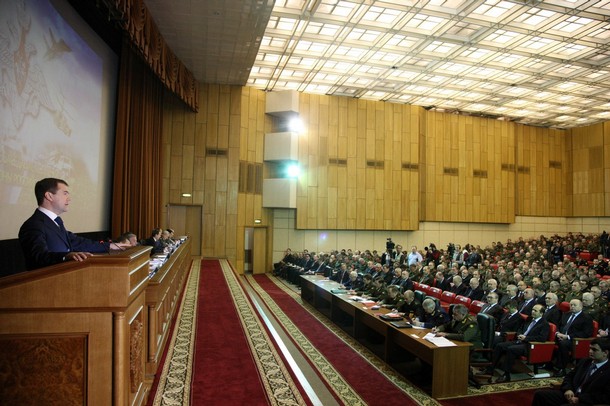
Russian Military Personnel Crisis: Medvedev and the General Staff Join the Fray
Publication: Eurasia Daily Monitor Volume: 7 Issue: 88
By:

It has been officially acknowledged that the Russian military faces a serious personnel crisis: the federal program to hire more contract soldiers has failed and their number will be reduced from 150,000 to 90,000, while massive draft-dodging and demographic problems are reducing the number of conscripts (EDM, April 29). Last week, the Chief of the Main Organizational-Mobilization Directorate (MOMD) of the General Staff, General-Colonel Vasiliy Smirnov, told the Federation Council Defense Committee that the situation is serious. He said that this year the MOMD may fail to muster enough conscripts to fill the ranks of the defense ministry and interior ministry combat units. The General Staff estimates the number of draft-dodgers in Russia today to be 200,000. Smirnov proposed draconian measures to increase the draft and punish dodgers. Russian males aged 18 to 27 are eligible to be drafted, but Smirnov announced plans to increase the upper age limit to 30. Smirnov also proposed calling up for one year university and college students after one or two years of their education (Interfax, April 29).
The MOMD hoped to fill the ranks with university and college graduates born in the 1980’s baby boom. This policy has been only partially successful: thousands of better educated and wealthy citizens do not want to spend time in the barracks, and instead dodge the draft (EDM, April 29). Smirnov clearly wants to increase pressure on this social group by raising the upper age limit to 30. The prolongation of the draft to 30 could allow the MOMD to prolong the “use” of the 1980’s baby boom by three years.
Today, most university and college students obtain a deferment from conscription until after graduation. To be drafted, the graduates must receive a draft call up document. Currently, the main tactic of draft dodging in Russia is to move to a rented apartment that the authorities do not know about to avoid being handed the document. As a countermeasure, Smirnov proposed an e-call up by SMS (most young Russians have mobiles) and to effectively annul the education deferment by drafting students, which is technically much easier while they (unlike graduates) are connected to universities that report their presence to the authorities (Interfax, April 29).
Recently announced plans by the Defense Minister, Anatoliy Serdyukov, to “humanize” military service in Russia have been largely welcomed by human rights activists (EDM, April 29). Smirnov’s draconian proposals to increase conscription have been met with indignation. Smirnov was accused of opposing Serdyukov’s military reform plans and President Dmitry Medvedev’s announced intention to “modernize Russia.” Valentina Melnikova, executive secretary of the Russian Union of Committees of Soldiers’ Mothers which publicly endorsed Serdyukov’s military “humanization,” called Smirnov’s proposals “crazy” and “an outrage.” Melnikova told journalists there may be a “mutiny in the defense ministry” (Interfax, April 29).
Of course, Smirnov is a quiet military bureaucrat with no direct command connection to any combat units and hardly a rebel. It would seem that while Serdyukov was offering the Russian public a carrot –to make military service more humane and attractive– Smirnov presented the stick to frighten and force potential conscripts to join. Serdyukov’s and Smirnov’s statements may have been coordinated.
This week, Medvedev joined the discussion, while visiting the 5th Separate Tamanskaya Guards motor-rifle brigade together with Serdyukov. The Tamanskaya (pre-2009 –the 2nd Guards motor-rifle division) has been for many decades a special unit based near Moscow to guard the Russian leadership against potential internal strife or a US-led decapitating surprise airborne assault on the Moscow region deemed possible during the Cold war. The Tamanskaya is a showcase unit with better food, and barracks for foreign dignitaries and journalists, as well as Russian leaders, to visit to see the positive side of the Russian military.
Serdyukov declared that in Tamanskaya catering is already done by civilians and that soon cleaning will be also done by civilian contractors. He promised that in three months Tamanskaya conscripts will be allowed “as an experiment” to have a 5-day working week and go home for holidays (RIA Novosti, May 5).
Medvedev, in the presence of journalists, had tea with newly drafted conscript soldiers, who expressed their satisfaction with service conditions. Medvedev told the soldiers (in the presence of TV cameras) to tell their friends not to be afraid to join: “The draft to serve must not be seen as some personal catastrophe.” Medvedev acknowledged “problems” with drafting, but promised that conscript service will not be extended: “One year is enough to train a good quality specialist, soldier or sergeant.” Medvedev acknowledged that in 2009 “there was a crisis with recruiting contract soldiers and there will be less of them,” but by fall a decision will be made how many kontraktniki Russia needs and how much to pay them. Medvedev promised that excellent service conditions in the Tamanskaya “experimental” brigade will be extended to the entire military (Interfax, May 5). Medvedev clearly joined Serdyukov in his drive to persuade draft-dodgers to join, but avoided commenting on Smirnov’s harsh proposals that seem to indicate they were endorsed.
If the Russian authorities manage to avoid a personnel crisis that may leave “permanent readiness units” undermanned and with reduced readiness levels in the coming year or two, this will only prove to be a stopgap. Russia has a one million strong armed force. The number of officers is being reduced to 150,000 and kontraktniki to 90,000. The interior ministry troops need annually tens of thousands of conscripts. With one year service, Russia needs more than 600,000 conscripts per year, while until 2025, there will only be around 400,000 new able-bodied 18-year old males annually. The reserve of students (if tapped), will soon be exhausted. It would seem Medvedev and Serdyukov are essentially going to great pains to avoid an immediate crisis before the presidential elections in 2012, and the unpopular decision to double conscript service is taken. Alternatively, the entire Russian military must be halved in size. In any case, combat units consisting of only one-year service soldiers cannot be fully combat ready. It is also impossible to pick and train a “good sergeant” in one year, though Medvedev may believe the opposite.




